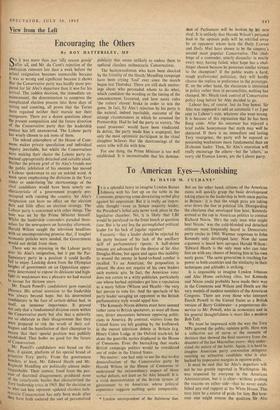View from the Left
Encouraging the Others
By ROY HATTERSLEY, MP C o it was more than just 'silly season gossip' °after all, and Mr. du Cann's rejection of the abdication rumours less than a week before the actual resignation becomes memorable because it was so wrong and significant because it shows that the Conservative party was hardly more pre- pared for Sir Alec's departure than it was for his arrival. The sudden decision, the immediate an- nouncement, the determination to compress the complicated election process into three days of voting and counting, all prove that the Tories have regained neither their morale nor •their Composure. There are a dozen questions about the present composition and the future direction of the Conservative party that the leadership contest has left unanswered. The Labour party has wisely chosen to ask none of them.
The inbred atmosphere of the House of Com- mons makes private speculation and individual inquiry inevitable, but whilst the Conservatives were making their choice the Labour party re- mained appropriately detached and suitably aloof. Neither the private grief of Sir Alec's friends nor the public jubilation of his enemies has moved a Labour spokesman to say an unkind word. A week spent emphasising the divisions in the Tory ranks or underlining 'the shortcomings of the rival candidates would have been utterly un- characteristic of a government properly pre- occupied with running the country. Sir Alec's resignation can have no effect on the election date and little effect on election strategy. The Labour party is concerned with other things. The tone was set by the Prime Minister himself. Whilst the leadership contenders paraded them- selves for the newspapers on Saturday afternoon, Harold Wilson caught the television headlines With an uncompromising promise that, if tougher economic policies were needed, the Government would not shrink from them.
There was no rejoicing in the Labour party over Sir Alec's resignation, but it put the Par- liamentary party in a position it could hardly fail to enjoy. Looking down from the Olympian heights of government on an Opposition appar- ently determined to expose its divisions and high- light its weaknesses was a pleasure we had waited to savour for thirteen years. Mr. Enoch Powell's candidature gave especial Pleasure. His actual accession to the leadership
Was always beyond hope, but his determined candidature in the face of certain defeat had, in itself, an immense importance. It proved not only •that a fundamental divi.sion exists within the Conservative party but also that a minority are so' obdurate in their disagreement that they Were prepared to risk the wrath of their col- leagues and the humiliation of their champion to ensure that their special position was publicly established. That bodes no good for the future of Conservatism.
Mr. Powell's candidature was based on the firm, if quaint, platform of his special brand of Primitive Tory purity. From the government benches, at least, Mr. Edward Heath and Mr. Reginald Maudling are politically almost indis- tinguishable. Their contest, freed from the pas- sion of doctrinal disagreement, produced none of the cataclysmic battles that characterised the Tory leadership crisis in 1963. But the decision as to who can best represent updated classless tech- nocratic Conservatism has only been made after they have both endured the sort of personalised
publicity that seems unlikely to endear them to updated classless technocratic Conservatives.
The backswoodsmen who have been shocked by the frivolity of the Heath/Maudling campaign have been crying 'foul' ever since the match began last Thursday. There are still dark mutter- ings about who persuaded whom to do what, which candidate the wording or the timing of the announcement favoured, and how many rules `the rotters' eleven' broke in order to win the game. In fact, Sir Alec's rejection by his party is the natural, indeed inevitable, outcome of the strange circumstances in which he assumed the Premiership. Had he led the party to victory, 'the usual processes' would have been vindicated. In defeat, the party made him a scapegoat, but only the most optimistic participant in the ritual slaughter believes that the shortcomings of the entire tribe will die with him.
For one thing, the Prime Minister is too well established. It is inconceivable that his domina-
tion of Parliament will be broken by his new rival. It is unlikely that Harold Wilson's personal lead in the opinion polls will be whittled away by an opponent whom both the Daily Express and Daily Mail have shown to be the country's second most popular Conservative. The chal- lenge of a contender, utterly dissimilar in nearly every way, having failed, what hope has a chal- lenger chosen because he possesses similar virtues to the champion? If the public wants a hard, tough professional politician, they will hardly choose the replica in preference to the prototype. If, on the other hand, the electorate is interested in policy rather than in personalities, nothing has changed. Mr. Heath took control of Conservative policy long before Sir Alec decided to go.
Labour has, of course, lost its free bonus. Sir Alec was supposed to add an automatic 1 or 2 per cent to Labour's vote, whatever else went wrong. It is because of this reputation that he has been flung aside. After his successor has enjoyed a brief public honeymoon that myth may well be shattered. If there is no immediate and lasting Tory resurgence, the party will be exposed as possessing weaknesses more fundamental than an ill-chosen leader. Then, Sir Alec's execution will really encourage the others—but the `others,' as every old Etonian knows, are the Labour party.




























 Previous page
Previous page